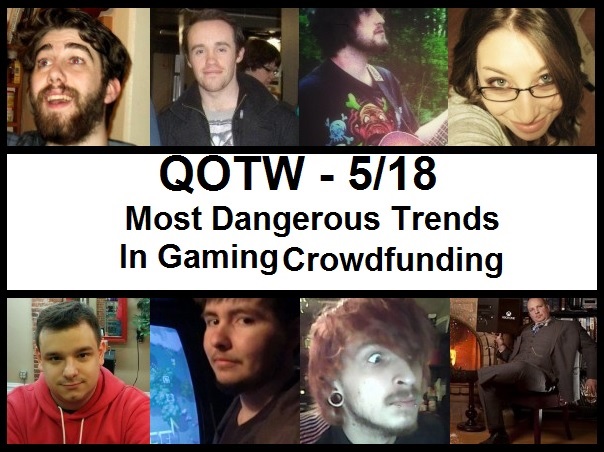Welcome to our weekly feature, “Question Of The Week.” As you can tell from that entirely original title each week we pose a question to our panel and they chime in with their opinions. No one sees one another’s responses until the story is posted, so each contributors thoughts are their own. Responses are posted in no particular order.
And remember, as with all editorials, the views expressed in this editorial are those of the authors and do not necessarily represent the views or opinions of Cliqist.com.
The question of the week for the week of 5/18/14 is :
What’s the most dangerous trend in gaming crowdfunding?
[divider]Brad Jones
The most dangerous crowdfunding trend is an overinflated focus on the thoughts and wishes of backers. I can see why people want to be involved with the development of a game, but it’s very true that ‘too many cooks spoil the broth’. Crowdfunding was once lauded as a way for developers to make the video games that they wanted to without the limits of publisher involvement, and that in itself is a very fine goal. However, when you factor in the wants and needs of a huge group of fans, the end result is that it’s simply a different set of people putting up the money and having their say.
What this leads to is design by committee, which is rarely something that produces great work. A range of different voices is a good thing, but trying to listen to all of them is bound to result in a product that doesn’t quite please anyone.
To read more of Brads’ work click here. To learn more about them check out our About Us page.
[divider]Martin Toney
The most dangerous aspect of the crowdfunding trend is without a doubt the ability to make use of a standing install base to essentially guarantee a niche targeted product is funded. This is prominent amongst (but not restricted) the video game crowdfunding market. One of the things that represents a very real threat to a marketplace is over saturation, and the reason many games don’t reach the development stage is that there are simply too many already like it and no one is willing to put their faith in its predicted sales. However, if a development team take to the likes of Kickstarter or IndieGoGo with a well made advertising campaign that shows of some interesting ideas (and most of the time, they are just ideas) they are all but assured to reach any low to moderate funding marks. The problem with this is a simple one. Just because you can make a game, doesn’t mean you should. Seriously, think about it. The next time you sit down and think to yourself, “this would make a great game”, take a step back and really think about it. Are you creating something that will truly innovate the genre and possibly inspire new creations that will in turn drive the industry and medium forwards? Or are you just making some more fluff to flood the digital marketplace that is already saturated with so much fodder?
To read more of Martins’ work click here. To learn more about them check out our About Us page.
[divider]Nathaniel Liles
I don’t know if we can really call it a “trend” quite yet, but I’m starting to see a few too many similarities between crowdfunded gaming and the video game crash brought about by Atari’s overproduction of sub-par games. Kickstarter is a great jumping-off point for new developers with great new ideas, but I’ve been seeing more and more lackluster titles being cranked out of crowdfunding and Greenlight. The worst part about this is that I don’t really see any solution. We need things like Kickstarter to give budding devs the resources they need to follow their dreams, but a combination of bad planning, lack of preparedness, and fear of backers suing developers is causing rushed, incomplete, or just plain lazily made games to dominate the “indie” culture.
To read more of Nathaniels’ work click here. To learn more about them check out our About Us page.
[divider]Julie Morley
I find that there are several campaigns that have been unsuccessful for not exactly offering much in their Kickstarter campaign. Sometimes there isn’t a Kickstarter video included for them to talk about not only the project they are working on, but themselves as well. When people want to get involved with a project and give some support they need a good idea of what they’re working with. If there’s minimal information about the game already out there, they don’t have much to lean back on and it can be a little bit suspicious. The more information and videos or pictures included in the campaign, the more informative and concrete it is.
To read more of Julies’ work click here. To learn more about them check out our About Us page.
[divider]David Lins
I’d say the most dangerous Kickstarter trend is telling and not showing. Yes, this fundamental rule of fiction applies to pitching your game to the internet. Don’t *tell* us why your project needs to be funded–*show* us. Too many kickstarter projects go up with little more than some concept art and a whole bunch of promises. If more than 90% of your video is just you talking to a camera, then it’s hard to trust you, even if there’s nice background music and good editing.
Why is this dangerous? Because it means any asshat with some fancy drawing skills and a silver tongue can ask for $100,000 to fund his retro love-letter to sidescroller shoot-em-ups and then take the money and run. Even beloved developers of old could turn to this just by saying their weird cult hit was always waiting to make that comeback.
I’ll admit I’m being a little extreme, but it’s possible. Getting too comfortable with throwing money at projects that haven’t even started can only end poorly, for you and for everyone. Think before you pledge, folks.
To read more of Davids’ work click here. To learn more about them check out our About Us page.
[divider]Marcus Estrada
There are a lot of dangers in the world of crowdfunding, but I think the most dangerous is simply related to developers who don’t know what they’re in for. To be successful and complete the project in a timely fashion requires consideration of many facets. For one, you must be able to accurately estimate the money required, how much will be lost to Kickstarter/PayPal/backer rewards, and all that. When mismanagement takes hold the path toward success becomes difficult – and more treacherous.
We’ve all heard stories of successful Kickstarters that have had to seriously reconsider their goals or outright cancel projects. No one wants this to happen, but it’s an unfortunate trend that will definitely continue. Hopefully as failed projects become more common, upcoming crowdfunders will more carefully consider the feasibility and cost of their projects.
To read more of Marcus’ work click here. To learn more about them check out our About Us page.
[divider]Ashton Harding
I feel like one of the most dangerous crowd funding trends is over-valuation of a project. You need to keep the budget realistic and fair. The crowdfunders are your biggest allies in this project, make sure to treat them fair and nicely. I have seen some great games fall to the rusted over blade of over-valuation. Frankly, it sucks. But keep in mind, as exciting as it is to have a game concept and be ready to get that glorious game crowdfunded, you need to contain that excitement, take a step back and try to figure out the costs of creating this game. Over-valuation can wound a game in its infant stages, and prevent it from ever happening.
To read more of Ashtons’ work click here. To learn more about them check out our About Us page.
[divider]Greg Micek
It might seem innocent, but I’ve been noticing developers changing their phrasing with regards to asking people to back their games. Instead of asking for “financial support”, “funding”, or “backing” I’m seeing the phrase “pre-order” show up. Say what you will about the whole pre-order situation in retail games, but at least you don’t run the risk of losing your money if everything goes wrong. Developers asking people to pre-order their game via crowdfunding is just inviting additional cynicism from the gaming world, especially when it has to be explained that a “pre-order” on Kickstarter isn’t a pre-order at all, but simply charity with prizes.
To read more of Gregs’ work click here. To learn more about them check out our About Us page.
[divider]Have a question you’d like our panel to answer? Post it below, or email greg@cliqist.com with your toughest crowdfunding questions!
[facebook][tweet][Google][pinterest][follow id=”Cliqist” size=”large” count=”true” ]











